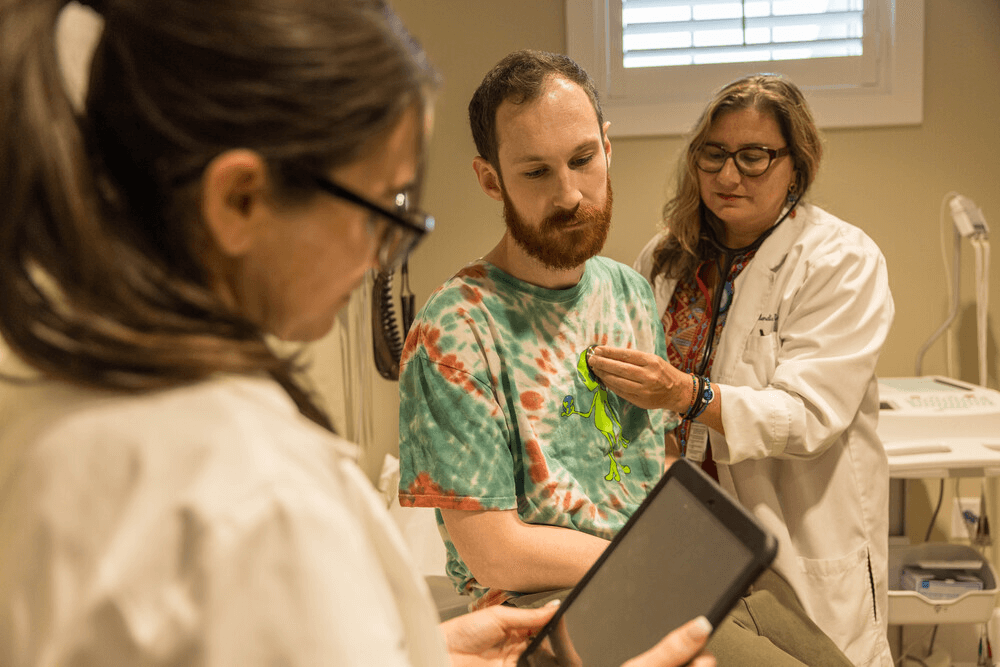
Types of Addiction We Treat: Substance Use and Co-Occurring Disorders
Innovative and Compassionate Care for Recovery and Healing

Substance addiction encompasses a broad spectrum of dependencies, ranging from alcohol and illicit drugs to prescription medications.[1]
Each substance carries its own unique risks, along with physical, psychological, and social challenges.
Moreover, co-occurring disorders—such as mental health conditions occurring alongside addiction—can further complicate the landscape of recovery.[2] These simultaneous issues often require specialized treatment approaches that address both substance abuse and underlying mental health concerns simultaneously.
Addiction is a complex condition—but it’s also a treatable one. Through a compassionate and supportive approach, you can begin the recovery journey and lead a healthy, happy life once again.

What is Addiction?
Addiction refers to a complex condition characterized by compulsive substance use or behavior despite suffering harmful consequences.[3] It typically involves an inability to control or limit the consumption of a substance or engagement in a behavior, leading to negative impacts on various aspects of your life, including health, relationships, work, and overall well-being.
Addiction can involve substances such as drugs or alcohol, as well as behavioral addictions like gambling, gaming, or overeating. It is often accompanied by physical dependence, withdrawal symptoms upon stopping, and psychological cravings.
Addiction is recognized as a chronic disease that requires comprehensive treatment and ongoing management to achieve recovery.
What Causes Addiction?
The development of addiction is influenced by a combination of genetic, environmental, and psychological factors.[4] Some may have a genetic predisposition to addiction, meaning they inherit certain genetic traits that increase their vulnerability to developing addictive behaviors.
Environmental factors, such as exposure to stress, trauma, peer pressure, or early substance use, can also contribute to the development of addiction. Additionally, psychological factors such as mental health disorders, personality traits, and coping mechanisms may play a role as well.
The neurobiological mechanisms underlying addiction involve changes in brain chemistry and circuitry, particularly in areas involved in reward, motivation, and decision-making.[5] Substance use or certain behaviors can trigger the release of neurotransmitters such as dopamine, which are associated with pleasure and reinforcement.

Over time, repeated exposure to these substances or behaviors can lead to neuroadaptations in the brain’s reward system, resulting in tolerance, dependence, and cravings. These changes can make it increasingly difficult to control substance use or behavior, contributing to the cycle of addiction.
What Are the Signs of Addiction?
Signs of addiction can vary depending on the substance or behavior involved, but common indicators include:[6]
Substance Addiction and Treatment
Seeking treatment for substance addiction is crucial. Untreated addiction can result in severe health complications, overdose, and even death.
By seeking treatment, you can access comprehensive care that addresses the root causes of addiction, develop coping strategies, and rebuild a fulfilling life free from substance dependence.
What Types of Addiction Treatment Are Available?
- Medical Stabilization: During the initial stages of recovery, medical stabilization is prioritized to ensure your safety and comfort as you stop using substances. This phase involves the implementation of innovative interventions and carefully managed medication schedules to alleviate symptoms and maintain physical well-being.
- Rehabilitation: Following medical stabilization, comprehensive rehabilitation services are provided to address the underlying factors contributing to addiction. Our rehabilitation programs incorporate evidence-based treatments, including medical and psychiatric consultations, various therapy modalities, community support, and relapse prevention skills training. These efforts aim to promote holistic healing and empower you to achieve sustained recovery.
- Aftercare Planning: After you complete rehabilitation, our dedicated aftercare planning department collaborates with you, your support networks, and your healthcare providers to develop personalized strategies for long-term success. This includes integrating you back into your daily routines, establishing ongoing support systems, and fostering accountability to maintain your progress and prevent relapse.
Alcohol
Treatment for alcohol addiction typically involves a combination of medical stabilization, counseling, support groups, and medication-assisted therapy (MAT) when appropriate. Treatment programs focus on addressing the underlying psychological factors contributing to alcohol abuse while providing tools for relapse prevention and long-term recovery.
Heroin
Treatment for heroin addiction may include medical stabilization, behavioral therapies such as cognitive-behavioral therapy (CBT), group counseling, and medication-assisted treatment with medications like buprenorphine or methadone.
Fentanyl
Treatment for fentanyl addiction often involves a combination of medical detoxification, behavioral therapies, and medication-assisted treatment with medications like buprenorphine.
Cocaine and Crack
Wellbridge offers comprehensive treatment for cocaine and crack addiction, including medical detoxification, individual and group therapy, cognitive-behavioral interventions, and relapse prevention strategies. Our programs focus on addressing the complex psychological and behavioral aspects of cocaine addiction while promoting healthy coping skills and lifestyle changes.
Opioids
Treatment for opioid addiction at Wellbridge may involve a combination of detoxification, medication-assisted treatment (MAT) with drugs like buprenorphine or methadone, counseling, and support groups. Our integrated approach aims to address physical dependence, cravings, and underlying psychological factors contributing to opioid addiction.
Adderall
At Wellbridge, treatment for Adderall addiction may include medical detoxification, cognitive-behavioral therapy, individual counseling, and holistic interventions to address co-occurring mental health issues. Our goal is to help individuals regain control over their lives and develop healthy coping mechanisms to manage ADHD symptoms without reliance on Adderall.
Benzodiazepines
Treatment for benzodiazepine addiction at Wellbridge often involves a gradual tapering of the medication under medical supervision, CBT, stress management techniques, and alternative therapies to promote relaxation and sleep. Our team provides personalized care to address physical dependence and psychological factors contributing to benzodiazepine addiction.
Methamphetamine
Wellbridge offers comprehensive treatment for methamphetamine addiction, including medical stabilization, behavioral therapies, support groups, and medication-assisted treatment when appropriate. Our programs focus on addressing the cognitive and behavioral aspects of methamphetamine addiction while promoting healthy lifestyle changes and relapse prevention strategies.
Ketamine
Treatment for ketamine addiction at Wellbridge may involve medical stabilization, psychotherapy, and holistic interventions to address co-occurring mental health issues. Our team provides personalized care to address the unique challenges associated with ongoing ketamine usage and support individuals in achieving lasting addiction recovery.
PCP
Wellbridge offers comprehensive treatment for PCP addiction, including medical stabilization, behavioral therapies, support groups, and medication-assisted treatment when appropriate. Our programs focus on addressing the cognitive and behavioral aspects of PCP addiction while promoting healthy lifestyle changes and relapse prevention strategies.
Barbiturates
Treatment for barbiturate addiction at Wellbridge may involve medical stabilization, cognitive-behavioral therapy, stress management techniques, and alternative therapies to promote relaxation and sleep. Our team provides personalized care to address both the physical dependence and psychological factors contributing to barbiturate addiction.
Marijuana
At Wellbridge, treatment for marijuana addiction may involve cognitive-behavioral therapy CBT, motivational interviewing, support groups, and holistic interventions to address underlying issues and promote lifestyle changes. Our goal is to help individuals develop healthy coping mechanisms and achieve balance in their lives.
Co-Occurring Disorder Treatment
Substance addictions are frequently intertwined with behavioral disorders, creating a complex web of challenges for individuals seeking recovery. These behavioral disorders, such as depression or anxiety, often co-occur with substance use, exacerbating the difficulties of both conditions.
Recognizing the interconnected nature of substance addiction and behavioral disorders underscores the importance of seeking treatment for the underlying behavioral disorder in conjunction with addressing substance use disorder.
At Wellbridge, we understand that successful recovery requires a comprehensive approach that simultaneously addresses the addiction and the underlying mental health issues.
By providing specialized care tailored to each individual’s unique needs, we aim to help clients achieve lasting sobriety and emotional well-being.
Depression
Treatment for depression and substance use disorder at Wellbridge may involve a combination of therapy modalities, medication management, and holistic interventions. Our programs focus on addressing the underlying causes of depression while equipping individuals with coping strategies to manage symptoms and prevent relapse.
Anxiety
Treatment for anxiety and substance use disorder at Wellbridge may include cognitive-behavioral therapy, exposure therapy, relaxation techniques, and medication management. Our integrated approach aims to help individuals develop healthy coping mechanisms to manage anxiety symptoms and reduce the risk of relapse.
Post-Traumatic Stress Disorder (PTSD) and Trauma
Wellbridge offers specialized treatment for PTSD and trauma-related disorders, combining evidence-based therapies and mindfulness-based interventions. Our trauma-informed care approach addresses the impact of past trauma on substance abuse and promotes healing and recovery.
Bipolar Disorder
Treatment for bipolar disorder and substance use disorder at Wellbridge may involve mood-stabilizing medications, psychoeducation, individual and group therapy, and lifestyle interventions. Our goal is to help individuals achieve mood stability, develop healthy routines, and manage symptoms of bipolar disorder without substance use.
Attention Deficit Hyperactivity Disorder (ADHD)
At Wellbridge, treatment for ADHD and substance use disorder may include medication management, CBT, organizational skills training, and support groups. Our programs focus on improving attention, impulse control, and emotional regulation while concurrently addressing substance abuse issues to begin the recovery process.
Obsessive Compulsive Disorder (OCD)
Treatment for OCD and substance use disorder at Wellbridge may involve exposure and response prevention (ERP) therapy, medication management, and mindfulness-based interventions. Our goal is to help individuals manage obsessive-compulsive symptoms and develop healthier coping mechanisms to reduce reliance on substances.

We’re With You—Every Step of the Way
Embarking on the path to recovery and seeking the right treatment center can feel like a daunting task. Whether you’re personally battling addiction or supporting a loved one through their journey, finding the right support system is crucial.
At Wellbridge, we’re committed to providing compassionate care and guiding you toward the resources and solutions that best fit your unique needs. Your journey to healing is our priority, and we’re here to walk alongside you, offering guidance, support, and encouragement every step of the way.
Frequently Asked Questions About Types of Addiction Treatment
How long does addiction treatment last?
The duration of addiction treatment varies depending on factors such as the severity of the addiction, the type of treatment program, and your rate of progress. A typical stay can last for 28 days, but it can range from a few weeks to several months or longer for more intensive programs or ongoing support.
What should I look for in an addiction treatment program?
When seeking an addiction treatment program, it’s important to consider factors such as the facility’s accreditation and credentials, the staff’s qualifications and experience, the treatment approach and therapies offered, the availability of aftercare and support services, the facility’s amenities and environment, and whether the program aligns with your individual needs and preferences.
Will my insurance cover addiction treatment?
Many insurance plans offer coverage for addiction treatment, but the extent of coverage can vary depending on your specific plan and provider. It’s advisable to contact your insurance company to inquire about coverage details, including any co-pays, deductibles, or limitations on treatment options. Additionally, many addiction treatment facilities have financial counselors who can assist you in navigating insurance coverage and payment options.
Sources
[1] Zou, Z., Wang, H., d’Oleire Uquillas, F., Wang, X., Ding, J., & Chen, H. (2017). Definition of Substance and Non-substance Addiction. Advances in Experimental Medicine and Biology, 1010, 21–41. https://doi.org/10.1007/978-981-10-5562-1_2 on April 30, 2024
[2] SAMHSA. (2023, July 26). Co-Occurring disorders and other health conditions. Www.samhsa.gov. https://www.samhsa.gov/medications-substance-use-disorders/medications-counseling-related-conditions/co-occurring-disorders on April 30, 2024
[3] National Institute on Drug Abuse. (2020, July). Drug Misuse and Addiction. National Institute on Drug Abuse; National Institutes of Health. https://nida.nih.gov/publications/drugs-brains-behavior-science-addiction/drug-misuse-addiction on April 30, 2024
[4] NIDA. (2018, June 6). Understanding Drug Use and Addiction Drug Facts. National Institute on Drug Abuse; National Institute of Health. https://nida.nih.gov/publications/drugfacts/understanding-drug-use-addiction on April 30, 2024
[5] Koob, G. F. (2011). Neurobiology of Addiction. FOCUS, 9(1), 55–65. https://doi.org/10.1176/foc.9.1.foc55 on April 30, 2024
[6] Cleveland Clinic. (2023, March 16). Addiction. Cleveland Clinic. https://my.clevelandclinic.org/health/diseases/6407-addiction on April 30, 2024
[7] Mayo Clinic . (2022, October 4). Drug addiction (substance use disorder) – symptoms and causes. Mayo Clinic; Mayo Clinic. https://www.mayoclinic.org/diseases-conditions/drug-addiction/symptoms-causes/syc-20365112 on April 30, 2024






